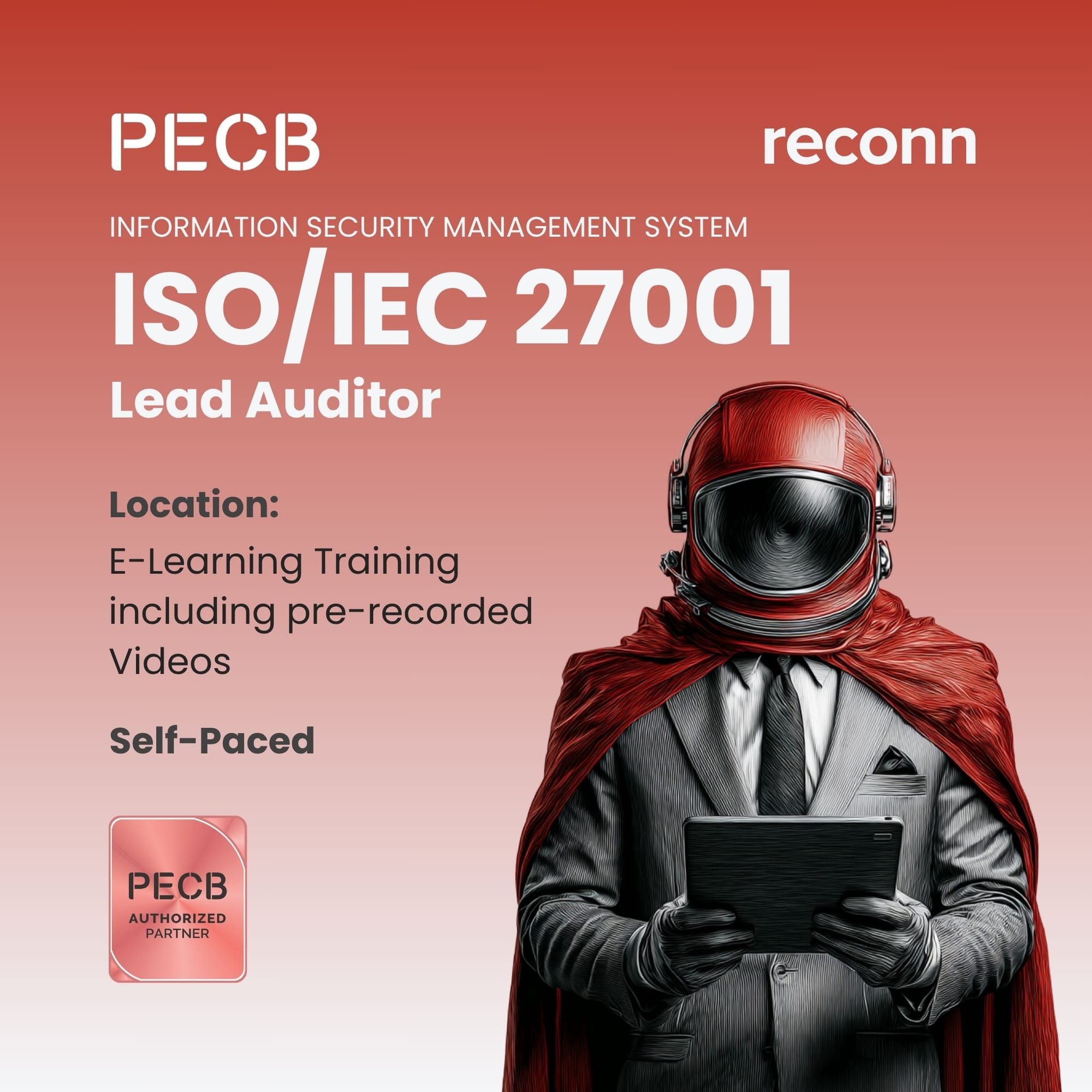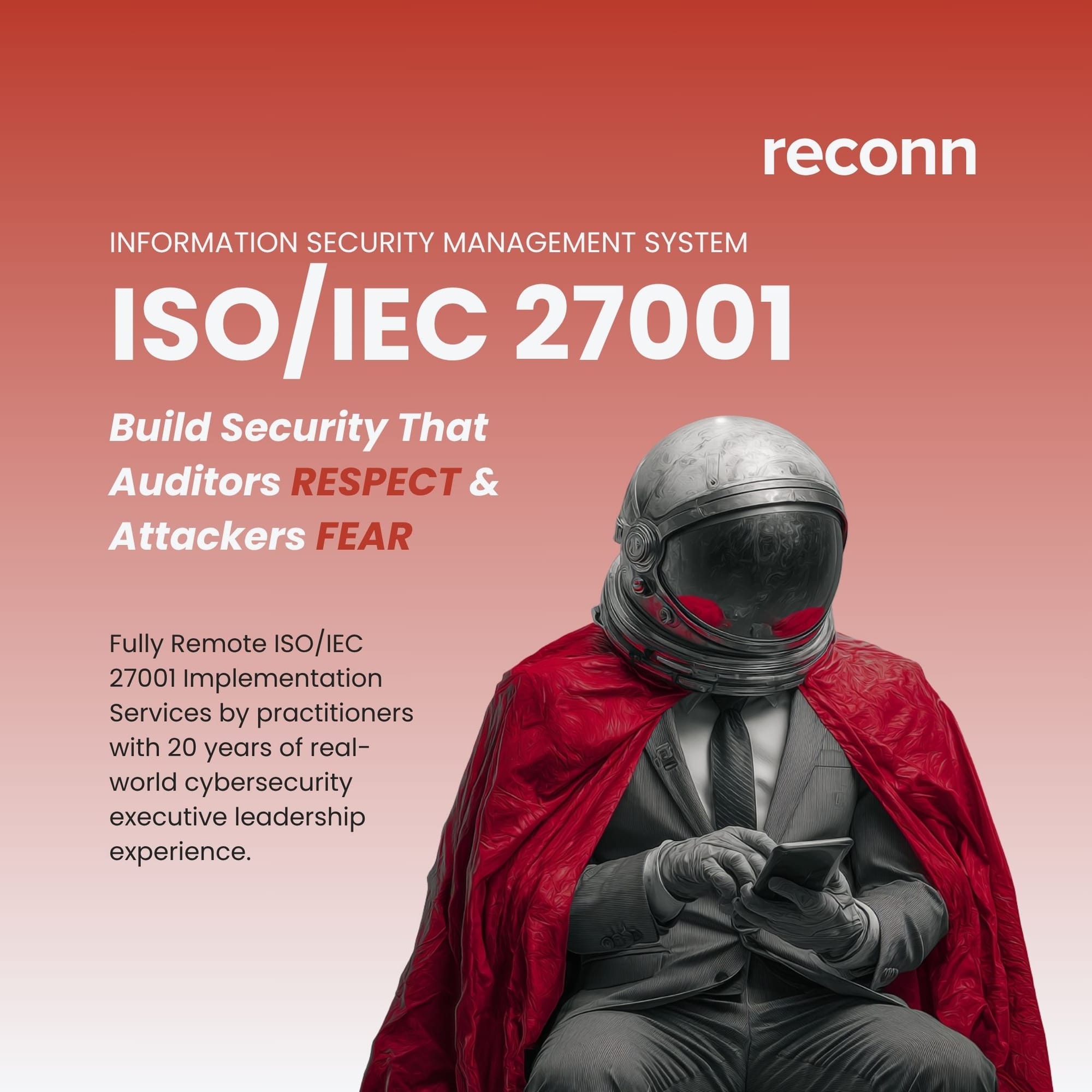ISO/IEC 27001: A Beginners crisp introductory Guide to Implementation, Compliance and Certification
Understand ISO/IEC 27001 – the international standard for building and maintaining a robust Information Security Management System.

Introduction
ISO/IEC 27001 is the global benchmark for Information Security Management Systems (ISMS). It offers a comprehensive framework for protecting sensitive data, ensuring confidentiality, integrity, and availability. This expanded guide covers the basics of the standard, its purpose, requirements, implementation process, and how reconn's remote ISO/IEC 27001 implementation services can accelerate your journey to certification.
Key Takeaways
- ISO/IEC 27001 is the leading global standard for establishing, implementing, maintaining, and improving an ISMS.
- The CIA triad—Confidentiality, Integrity, Availability—is the foundation of ISO 27001’s information security principles.
- Compliance is not the same as certification; certification requires passing an accredited audit.
- Annex A contains 93 controls grouped into organizational, people, physical, and technological categories.
- A management system approach ensures information security is proactive, structured, and continually improved.
- Remote implementation and auditing save time, reduce costs, and provide access to top-tier expertise anywhere in the world.
- PECB self-study and eLearning options allow individuals to earn ISO 27001 Lead Auditor or Lead Implementer certifications 100% online.
- Reconn provides ongoing support—from gap analysis and ISMS documentation to Q&A and exam prep sessions—until certification is achieved.

ISO/IEC 27001 Lead Auditor Certification
100% Online ISO/IEC 27001 Lead Auditor Certification program. Choose between self-study or elearning delivery option. Includes official courseware from PECB and 2x Examination attempts.
Basics of ISO/IEC 27001
What does ISO/IEC 27001 mean?
ISO/IEC 27001 is an internationally recognized standard for information security management. The name itself tells us a lot:
- ISO stands for the International Organization for Standardization, an independent, non-governmental international body that develops and publishes global standards across industries.
- IEC stands for the International Electrotechnical Commission, which develops standards for electrical, electronic, and related technologies. When both ISO and IEC are listed, it means the standard is a joint publication.
- 27001 is the unique identifier for this specific standard within the ISO/IEC 27000 family, which focuses on information security.
In practical terms, ISO/IEC 27001 specifies the requirements for establishing, implementing, maintaining, and continually improving an ISMS. It provides a systematic approach to managing sensitive information so that it remains secure—covering people, processes, and IT systems by applying a risk management process.
The standard is technology-neutral and industry-agnostic, making it applicable to any organization—large or small, public or private—seeking to secure its information assets against threats ranging from cyberattacks to insider misuse.
Compliance with ISO/IEC 27001 demonstrates to clients, partners, regulators, and stakeholders that your organization takes information security seriously and follows internationally approved best practices.
The purpose of the ISO/IEC 27001 Standard
It enables organizations to systematically identify, assess, and address information security risks through a structured risk management process. This involves recognizing potential threats, evaluating their likelihood and impact, implementing appropriate controls to mitigate them, and continuously monitoring and improving these measures. By doing so, the standard ensures that information remains secure against threats ranging from cyberattacks and insider misuse to physical breaches and accidental loss.
Why ISO/IEC 27001 is important and what are its benefits
The benefits of ISO/IEC 27001 are both strategic and operational. Strategically, it improves customer and stakeholder trust by demonstrating a verified commitment to protecting sensitive information.
It reduces the risk and potential impact of data breaches through systematic risk management and robust controls. Compliance with ISO/IEC 27001 also supports adherence to legal and regulatory requirements such as GDPR, HIPAA, or regional data protection laws, helping avoid penalties. Operationally, it strengthens organizational resilience by preparing for and responding effectively to security incidents, while fostering a culture of security awareness.
Finally, it delivers a competitive edge in the marketplace, as certification is often a prerequisite for winning high-value contracts and building long-term business partnerships.
The three principles of ISO/IEC 27001
Confidentiality, Integrity, and Availability (CIA) form the foundation of ISO/IEC 27001’s approach to information security. Together, these three principles ensure that information is protected from unauthorized access, remains accurate and trustworthy, and is available to those who need it without unnecessary delay.
- Confidentiality – Safeguarding information from unauthorized access or disclosure through measures such as access controls, encryption, and secure communication channels.
- Integrity – Preserving the accuracy, consistency, and reliability of data throughout its lifecycle, ensuring it is not altered or destroyed improperly, with changes tracked via version control and audit trails.
- Availability – Guaranteeing that authorized users can reliably access information and resources when required, supported by redundancy, disaster recovery, and business continuity planning to prevent or minimize downtime.
Why we need an ISMS
An ISMS(Information Security Management System) provides a structured, repeatable approach to safeguarding sensitive information, but its value extends beyond basic protection.
Without an ISMS, organizations often rely on ad‑hoc or reactive measures that leave gaps in security, increase the risk of breaches, and make compliance harder to achieve. A management system like an ISMS sets defined policies, assigns responsibilities, and establishes processes for continuous monitoring, improvement, and accountability.
It aligns security with business objectives, ensuring that information risks are managed proactively rather than reactively.
Living without an ISMS means accepting higher levels of uncertainty, potential non‑compliance, reputational damage, and financial loss.
How ISO/IEC 27001 implementation work
Operates on the Plan-Do-Check-Act (PDCA) model, encouraging continuous improvement. In practical terms, implementing ISO/IEC 27001 typically involves:
- Plan: Define the ISMS scope, perform a risk assessment, identify necessary controls, and establish policies.
- Do: Implement the selected controls, deliver staff training, and roll out security procedures.
- Check: Conduct internal audits, monitor performance metrics, and review incident reports to ensure controls are effective.
- Act: Address nonconformities, update risk treatment plans, and continually refine processes based on audit findings and changing risks.
Following these steps in an iterative cycle ensures the ISMS evolves alongside the organization's needs and emerging security threats.
ISO/IEC 27001 controls
What is a control? In the context of information security, a control is any measure, policy, practice, process, or technology designed to manage or reduce a specific risk to information assets. Controls can be preventive, detective, or corrective in nature.
ISO/IEC 27001 controls are the specific safeguards and countermeasures outlined in Annex A of the standard that organizations can implement to address identified risks. In the 2022 version there are 93 contorls. They are grouped into four main categories:
- Organizational controls – Governance, policy management, compliance, supplier relationships, and overall security program oversight.
- People controls – Measures that involve personnel, such as training, awareness, role-based access, and background checks.
- Physical controls – Safeguards for physical environments, including secure areas, entry controls, and protection against environmental threats.
- Technological controls – Technical measures like encryption, network security, system monitoring, and malware protection.
How to implement controls in ISO/IEC 27001
Implementing ISO/IEC 27001 controls effectively involves several key steps:
- Conduct a comprehensive risk assessment to identify potential threats and vulnerabilities.
- Map identified risks to relevant Annex A controls, selecting those that best mitigate the risks in your organizational context.
- Develop and formalize policies and procedures to embed these controls into daily operations.
- Provide targeted training and awareness programs so staff understand their roles in maintaining security.
- Deploy necessary technical, physical, and organizational measures to bring the controls into action.
- Monitor and measure control performance regularly, using audits, KPIs, and incident reports to ensure effectiveness and identify improvement areas.

PECB Catalogue
Explore PECB’s globally recognized course catalogue featuring certifications in AI, cybersecurity, ISO standards, governance, risk, and compliance—designed for professionals seeking expertise and career advancement.
What are the Requirements of ISO/IEC 27001
There are Two parts of the standard
- Clauses 4–10 – Core ISMS requirements: These clauses define the foundational structure for establishing, implementing, operating, and improving an ISMS. They cover essential elements such as understanding the organization’s context, leadership commitment, information security planning, resource and competence management, operational controls, performance evaluation through monitoring and internal audits, and continual improvement.
- Annex A – Reference controls: Annex A provides a comprehensive set of 93 controls grouped into organizational, people, physical, and technological categories. These serve as a catalogue from which organizations select controls relevant to their specific risk profile, based on their Statement of Applicability.
Requirements for ISO/IEC 27001 compliance
Meeting ISO/IEC 27001 compliance is a structured process that ensures information security is integrated into the organization’s culture and daily operations. Key steps include:
- Define the ISMS scope: Clearly establish which business units, processes, locations, and information assets are within the ISMS boundary.
- Identify the context and stakeholders: Analyze internal and external issues and determine the needs and expectations of interested parties, such as customers, regulators, and suppliers.
- Conduct a formal risk assessment: Systematically identify, analyze, and evaluate threats, vulnerabilities, and impacts to information assets.
- Select and justify Annex A controls: Match appropriate controls to each identified risk, documenting rationale in the Statement of Applicability.
- Develop ISMS documentation: Create policies, procedures, standards, and guidelines that form the ISMS framework and ensure operational consistency.
- Assign responsibilities and authorities: Define clear roles for ISMS management, risk owners, control owners, and audit functions.
- Implement and integrate controls: Roll out selected controls across people, processes, and technologies, ensuring they become part of everyday workflows.
- Conduct awareness and training programs: Embed security consciousness at all organizational levels through regular communication and targeted training.
- Monitor and measure ISMS performance: Use KPIs, incident reporting, audit results, and management reviews to assess effectiveness.
- Continually improve: Apply lessons learned, corrective actions, and updates to adapt the ISMS to emerging risks, technologies, and business changes.
ISO/IEC 27001 Implementation and Certification
ISO/IEC 27001 compliance vs certification
Compliance means that an organization has implemented processes, controls, and documentation in line with the ISO 27001 standard, but it may not have undergone a formal audit. This can be useful for internal assurance, meeting partial regulatory expectations, or preparing for certification.
Certification, on the other hand, is a formal recognition granted by an accredited certification body after a successful audit process. This certification is valid for three years, subject to annual surveillance audits to confirm ongoing compliance.This involves two key stages:
Stage 1 (Documentation Review), where the auditor examines your ISMS documentation and readiness, and
Stage 2 (Implementation Audit), where they verify that controls and processes are effectively implemented and maintained in practice. Passing both stages confirms that your ISMS meets all ISO 27001 requirements.
Mandatory documents for ISO/IEC 27001
The standard specifies several required documents, including: ISMS scope statement, information security policy, risk assessment and risk treatment plan, Statement of Applicability (SoA), records of internal audits, management review meeting minutes, and corrective action records. These documents provide evidence of compliance and support audit activities.
ISO/IEC 27001 Versions overview
- 2005 – The initial version, focused heavily on control implementation.
- 2013 – Major revision introducing a risk-based approach and alignment with Annex SL for integration with other management system standards.
- 2022 – Latest update, reducing controls from 114 to 93, reorganized into four themes for better clarity and adaptability.
Is ISO/IEC 27001 Compliance and Certification Mandatory?
ISO/IEC 27001 is not legally required in most jurisdictions; however, it is often a contractual or regulatory requirement in industries handling sensitive data such as finance, healthcare, and government. Many organizations pursue certification to meet customer demands, strengthen their market position, and demonstrate a proactive approach to information security.
ISO/IEC 27001 and Other Standards
The ISO/IEC 27000 family
The ISO/IEC 27000 series is a family of interconnected information security standards designed to provide comprehensive guidance on establishing, implementing, maintaining, and improving an ISMS. Key members include:
- ISO/IEC 27002 – Detailed controls guidance and implementation best practices for the Annex A controls in ISO 27001.
- ISO/IEC 27005 – A dedicated framework for information security risk management, offering methodologies for risk assessment and treatment.
- ISO/IEC 27004 – Guidance on information security measurement and metrics, helping organizations evaluate ISMS performance and effectiveness.
ISO’s code of practice
The "code of practice" refers to ISO 27002, which describes internationally recognized best practices for managing information security controls, policies, and operational processes. It is a companion to ISO 27001, providing practical details on how to implement the control objectives listed in Annex A.
Supporting standards
Several other standards complement ISO/IEC 27001 and help organizations tailor their ISMS to specific needs:
- ISO/IEC 27002 – Implementation guidance for Annex A controls, including purpose, implementation tips, and additional considerations.
- ISO/IEC 27003 – Guidance on planning and implementing an ISMS, with project management techniques and phased approaches.
- ISO/IEC 27004 – Methods for developing and using measurement metrics to monitor ISMS performance and support continual improvement.
- ISO/IEC 27005 – Comprehensive guidance on information security risk management, including identifying, analyzing, evaluating, and treating risks in alignment with ISO 27001 requirements.
How Reconn Helps You Achieve Certification
Reconn’s ISO 27001 experts specialize in remote implementation, compliance, and certification support, offering organizations flexibility, speed, and access to top-tier expertise without geographical limitations. Remote delivery means less disruption to your operations, faster turnaround times, and the ability to collaborate with seasoned specialists regardless of location.
Choosing experienced ISO 27001 Lead Auditors and Lead Implementers—rather than general consultants—ensures that your ISMS is built to meet both the letter and the spirit of the standard. Our team brings years of audit and implementation experience, a deep understanding of sector-specific challenges, and a proven track record of helping organizations achieve certification on the first attempt.
Here’s how we do it:
- Gap analysis – Thoroughly assess your current practices against ISO 27001 requirements to identify strengths and areas for improvement.
- Risk treatment planning – Develop tailored strategies to address identified risks using appropriate Annex A controls.
- ISMS documentation – Create clear, audit-ready policies, procedures, and records aligned with your organization’s context.
- Internal audits – Conduct objective, remote internal audits to verify readiness and identify nonconformities before the certification body does.
- Certification readiness support – Guide you through Stage 1 and Stage 2 audits, preparing responses to auditor questions and evidence requests.
- Ongoing compliance management – Provide continuous monitoring, periodic reviews, and improvement recommendations to maintain certification and adapt to evolving threats.

ISO/IEC 27001 Remote Implementation Services
Fully Remote ISO/IEC 27001 Implementation Services by practitioners with 20 years of real-world cybersecurity executive leadership experience.
ISO/IEC 27001 Lead Auditor and Lead Implementer Training and Certification
For individuals aiming to advance their careers in information security, ISO/IEC 27001 Lead Auditor and ISO/IEC 27001 Lead Implementer certifications remain among the most sought-after qualifications. Reconn, an Authorized Training Partner of PECB offers these programs entirely online through self-study and eLearning formats, giving professionals the freedom to learn anytime, anywhere.

ISO/IEC 27001 Lead Auditor Certification
100% Online ISO/IEC 27001 Lead Auditor Certification program. Choose between self-study or elearning delivery option. Includes official courseware from PECB and 2x Examination attempts.
Why Self-Study and eLearning Are in High Demand
While Reconn does conduct virtual classroom training, we’ve observed that the majority of candidates now prefer self-paced learning because it fits seamlessly into their work and personal schedules. Self-study allows learners to progress at their own pace, revisit complex topics as needed, and balance training with ongoing professional commitments.
Benefits for Individuals
- Global recognition – These certifications are accepted worldwide, boosting employability and credibility.
- Unmatched flexibility – 100% online access means no travel, no fixed schedules, and complete control over study time.
- Career advancement – Opens doors to roles in governance, risk management, and compliance.
- Practical expertise – Gain real-world skills in auditing or implementing an ISMS.
- Cost-effectiveness – Reduce travel and accommodation expenses compared to in-person training.
How Reconn Enhances the Self-Study Experience
As an authorized Training Partner of PECB courses, we go beyond simply providing the training material. We offer:
- Ongoing online Q&A sessions – Get answers to your questions directly from ISO/IEC 27001 experts.
- Exam preparedness sessions – Focused coaching on PECB exam structure, question styles, and strategies.
- Support until you pass – Continuous guidance and feedback until you successfully clear your certification exam.
With our support, you’re not just buying a course—you’re investing in a guided journey to certification success.
Conclusion
ISO/IEC 27001 is more than a standard—it’s a proven pathway to building trust, strengthening resilience, and unlocking new business opportunities. Whether you’re an organization seeking certification or an individual aiming to boost your career with a globally recognized credential, the right guidance makes all the difference.
At Reconn, we combine deep technical expertise, real-world audit experience, and flexible delivery methods to help you succeed—wherever you are and whatever your goals. From remote ISMS implementation to PECB-certified training with full online support, we ensure you have the tools, confidence, and capability to meet and maintain the highest standards of information security.
Your journey toward ISO/IEC 27001 excellence starts here—let’s make it happen together.



